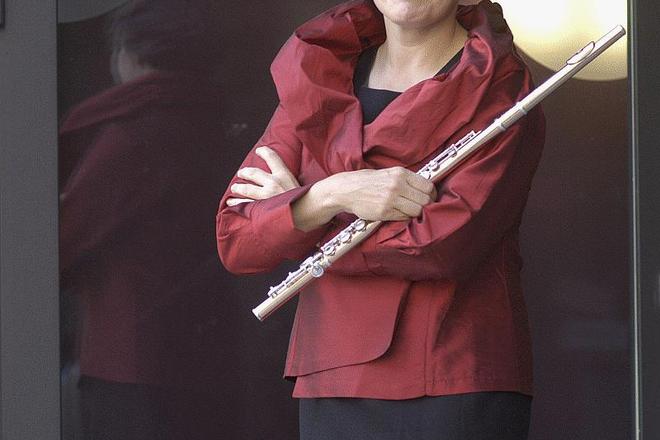The Mozart Hall in the building of the Austrian Cultural Forum (RKF) has traditionally been the venue for concerts organised by the Austrian Embassy in Bratislava. On April 12, Austrian flautist Elisabeth Möst performed together with pianist Naoko Knopp, and as an encore they offered audiences Mozart’s Sonata in F, KV 13, 2nd part-Andante, which represented a symbolic farewell to the historical room where, Mozart, as a young musical prodigy reportedly once performed a concert. The Möst concert was the last one organised by the RKF in this space, as the cultural forum is currently moving to different building in central Bratislava.
Asked how she chose musical pieces for her concerts and what was the key to combining them, Möst answered: “It is often a jubilee of a composer [e.g. Josef Wölfl – 1773-1812 – whose Sonata Op. 28, edited only recently, opened the concert at the RKF], or a specific occasion. Each of my concerts should have a golden thread. Most of the time these are personalities whose anniversary is celebrated in that very year; or I invent a connection for the concert. Once the motif was water, then the Elf-dance, or the contrasting of Russian and American music. For the Bratislava evening, the leitmotif was an overview of Austrian composers from the 18th century to the 21st centuries. The idea was to show that there is enough Austrian music to present, apart from Mozart,” she explained.
The works by Wölfl, Carl Frühling (1868-1937, and his recently discovered “Fantasy”), Morgana (born 1972; “Mission Impossible”), Wolfram Wagner (born 1962: “Duo: Fantasie-Elegie-Tanzfuge”) and Franz Schubert (1797-1828: Variationen über “die trocken Blumen”) were not just composed in diverse periods, but they also differed in their mood and general character, with relaxing, dreamy pieces interwoven with stormy, forceful ones. In an interview with The Slovak Spectator, Möst explained where she found the ideal pieces to be perform on the flute, and how she combined instruments that go well with her own: “As for instruments, I like very much the combination of flute and piano, flute and harp, and also flute-cello-piano. Now, I cooperate with a good string quartet, Amaryllis Quartett. I travel a lot, and I often visit libraries in other cities. Then there are flute festivals, e.g. in the UK, USA – I travel this year to Manchester and Las Vegas – where there are always new works exhibited and presented. This is one of the goals of a flute festival: to popularise unknown works. In the meantime, there are specialised flute magazines published which also help discover compositions apt for this instrument.
And from time to time, I am lucky enough to get the gift of a tune composed especially for me. There have been composers who have created works for me, and I premiere them. Currently, a Romanian composer, Violeta Dinescu, is putting together a concert for me, for flute and chamber orchestra. I hope she will finish it soon.”
Möst studied at private universities in Linz and Vienna, and took lessons from renowned musicians in Italy, France, the UK and USA, including William Bennett at London’s Royal Academy of Music. She is now a professor at the International Academy of Music in Göttingen, Germany, while also performing at various festivals and concerts, lecturing and recording albums. As a hobby, she writes poems and has also published a book for children. “It was a chance event,” Möst commented. “I wrote a short story for my nephew for Christmas, and one of my friends, an editor, offered it to a publishing house, and it was accepted. This was a huge surprise for me; but it is, in fact, a by-product. As for poems, they are just short excerpts of my life experiences, when something funny happens, etc. It is just fun for me, unlike the music, which is my job,” she concluded.



 Elisabeth Moest (source: Courtesy of Elisabeth Moest)
Elisabeth Moest (source: Courtesy of Elisabeth Moest)